-
Girl Scout Does Smokin’ Business
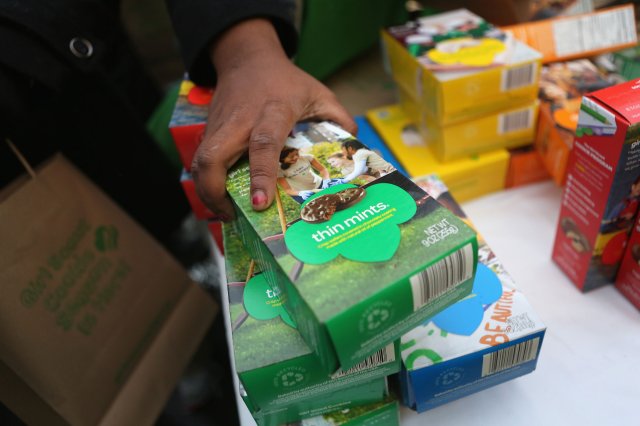
John Moore—Getty Images Girl Scout cookie-selling season may be all Thin Mints and Samoas for the cookie-eating public, but the girls hawking those treats have to work long, hard days, awkwardly hovering outside grocery stores with competing cookies inside or going door to door. That is, unless you are a brilliant 13-year-old named Danielle Lei. In February, Lei and her mother set up shop outside a medical marijuana dispensary in San Francisco — and sold 117 boxes of cookies in two hours.
The story went viral, with pundits dubbing Lei “enterprising,” “one smart cookie” and “due a special merit badge.” But not everyone found Lei’s capitalization on the munchies a feat to applaud. “If you are wondering, we don’t allow our Girl Scouts to sell cookies in front of marijuana shops,” tweeted the Girl Scouts of Colorado. Happily for Lei, the chapter of the Girl Scouts that oversees her area took a more libertarian approach. “Girls are selling cookies, and they and their parents pick out places where they can make good sales,” a spokeswoman for the Girl Scouts of Northern California told Mashable. “We’re not telling people where they can and can’t go if it’s a legitimate business.”
-
The Doobie Bowl
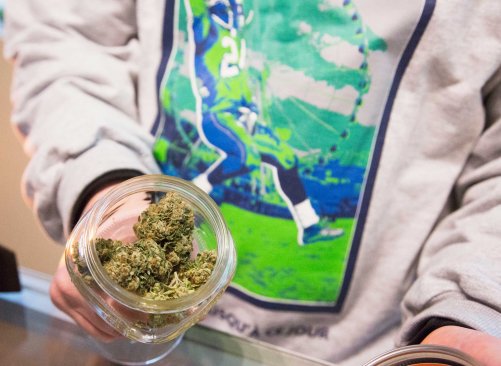
Jason Redmond—Reuters Nate Johnson, managing owner of the Queen Anne Cannabis Club, shows a strain of marijuana he carries in Seattle on Jan. 28, 2014. Oh, how easy the jokes came when the only two states to have legalized weed at the time went head-to-head in the Super Bowl. With the Seattle Seahawks taking on the Denver Broncos, fans and journalists quickly suggested renaming the event the “Stoner Bowl,” “Doobie Bowl,” “Smoke-A-Bowl” or “first ever Marijuana Bowl.” Some wondered if Cheetos or Doritos would step in as a special sponsor. Allen St. Pierre, the executive director of the National Organization for the Reform of Marijuana Laws (NORML), joked that the matchup should be dubbed the “Super Oobie Doobie Bowl,” a name that caught on in the media.
-
Setting the Stage for 2016
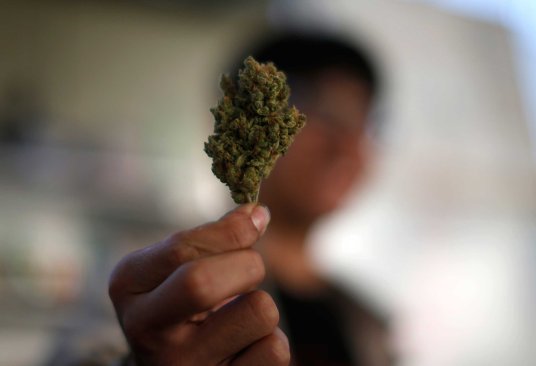
Lucy Nicholson—Reuters A volunteer holds a dried cannabis bud at the La Brea Collective medical marijuana dispensary in Los Angeles on March 18, 2014. There’s perhaps no bigger prize for legalization advocates in the country than California, where more than one in ten Americans lives. In September, the Marijuana Policy Project, the group behind the successful legalization effort in Colorado, officially formed their committee to legalize marijuana in the nation’s most populous state in 2016. They announced that they would start raising funds immediately to get a legalization measure on the ballot.
Pot legalization is generally more popular among young people, and young people are more likely to go to the polls in a presidential election year, which is a big part of the reason that major legalization advocacy groups didn’t pursue what NORML’s Allen St. Pierre calls “the big enchilada” in 2014. “When California legalizes marijuana,” St. Pierre says, “that creates unbelievable political impetus.”
-
A Historic April 20th

Helen H. Richardson—Denver Post/Getty Images Hundreds of people light up joints, bongs, pipes and marijuana cigarettes at exactly 4:20 pm during the Colorado 420 Rally at Civic Center Park in Denver on April 20, 2014. Denver has long been known for their annual 4/20 celebration, a rally to celebrate weed on its unofficial holiday of April 20th. But in 2014, the first year that legal recreational pot shops existed in the U.S., organizers lit the city up. Tens of thousands of people convened at Denver’s Civic Center to have a collective smoke at 4:20 p.m., while seas of stoners attended an industry expo, concerts by the likes of Snoop Lion and formal competitions among dispensaries to present the finest strains and vaporizers.
In advance of the 4/20 rally, organizers had attempted to get permission from Denver city officials to temporarily allow the public consumption of marijuana, which remains illegal in the Rocky Mountain State. Though their arguments that the city suspends its rules against the public consumption of alcohol for certain festivals fell flat, mass arrests did not come to pass. Police did issue dozens of $150 citations for the public consumption of weed at the rally, up from five in 2013.
-
New York Embraces “Compassionate Care”
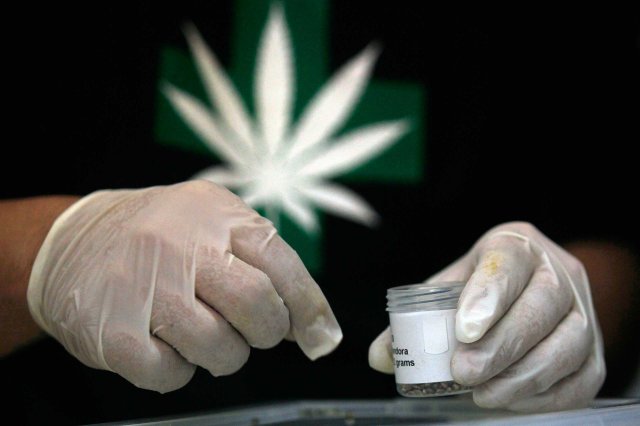
Luis Hidalgo—AP A member of the Daya Foundation, a nonprofit group that sponsors pain-relieving therapies, shows a container of imported cannabis seeds during a media presentation in La Florida, Chile on Oct. 29, 2014. In July, Gov. Andrew Cuomo signed the Compassionate Care Act, making New York the 23rd state, along with the District of Columbia, to legalize medical marijuana. The news was greeted as bittersweet by legalization advocates: the reform put a powerful state on their side of the issue but it also happened to be one of the most restrictive in the country. No smoking of cannabis, for instance, is allowed, and only patients who have a serious ailment on a limited, predefined list can be prescribed the drug.
Earlier in 2014, Maryland and Minnesota became the 21st and 22nd states to legalize some form of medical marijuana. Debates in each state centered around how to provide oversight so that people don’t abuse the system, while giving sick patients access to another treatment option. “There is no doubt that medical marijuana can help people,” Cuomo said when he signed the bill into law. “We are here to help people. And if there is a medical advancement, then we want to make sure that we’re bringing it to New Yorkers.”
-
D.C. Decriminalizes
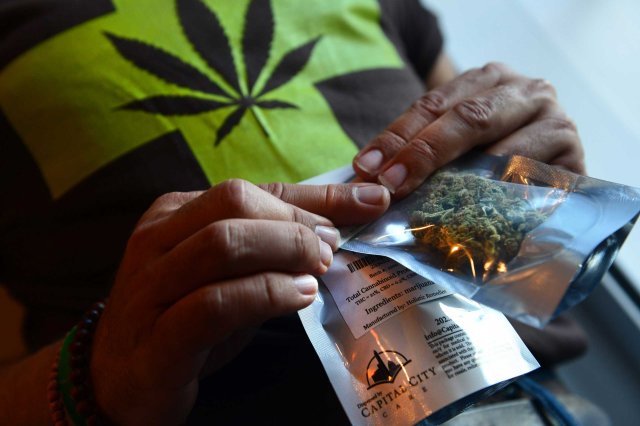
Linda Davidson—The Washington Post/Getty Images A man purchases medical marijuana, the first legal sale, at Capital City Care in Washington, D.C., on July 29, 2013. In the spring, D.C. officials passed a law decriminalizing the possession of small amounts of marijuana, meaning that having less than an ounce of weed in one’s pocket would lead to a $25 civil ticket (and confiscation of the drug) instead of handcuffs and jail time. The District joined 17 other states that have some form of decriminalization, but reform in the nation’s capital is more salient than most.
Congress has the power to intervene when a law passes in D.C., one-fourth of which sits on federal land. While lawmakers on the House Oversight committee did hold a hearing after the new law passed, they did not block it, and decriminalization went into effect in July. Outfits like the Capitol Police, Secret Service and U.S. Park Police retain the power to arrest anyone carrying any amount of weed, under the power of federal statutes.
-
Banks Get the Yellow Light
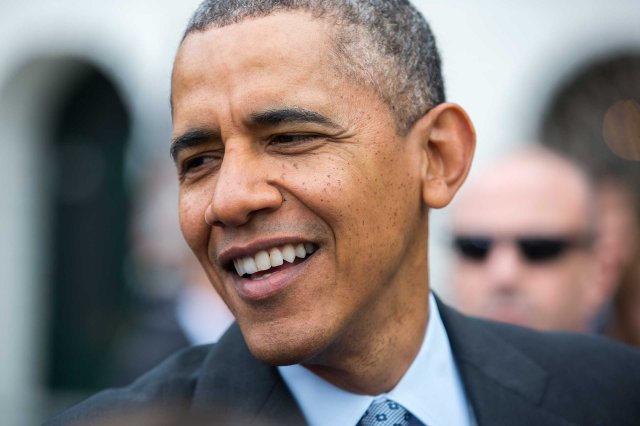
Brooks Kraft—Corbis U.S. President Barack Obama on the South Lawn of the White House in Washington, D.C., on Apr. 24, 2014. After legal pot shops first opened on New Year’s Day, a big problem quickly emerged from the haze. Because the federal government views weed as an illegal substance, banks balked at working with people running new weed-dispensing retail stores in places like Colorado. That forced multi-million-dollar businesses to operate entirely in cash. Worried about robberies, proprietors started using false walls, armed guards, vaults and decoys who would run empty briefcases out of their stores.
In February, the federal government helped change that dangerous state of affairs by issuing guidance from the Department of Justice and Treasury Department, which outlined how banks could do business with legal marijuana outfits. “Taken together, they offer a long-sought roadmap for both the banking and marijuana industries,” TIME’s Alex Altman wrote. While the memos still left some financial institutions wary of being prosecuted for accepting money from drug sales, the move also signaled that the federal government has little interest in disrupting the new industry.
-
Washington Pot Shops Open Their Doors
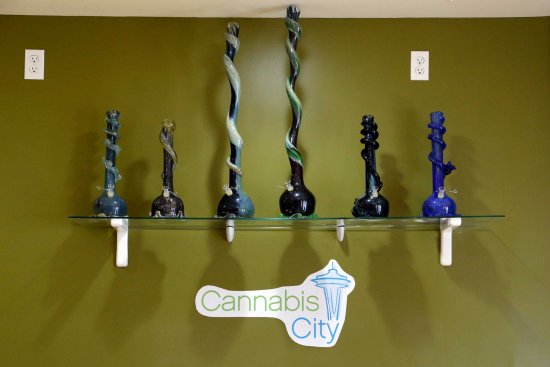
Elaine Thompson—AP Glass pipes line a shelf at the Cannabis City marijuana shop days before the grand opening in Seattle on July 2, 2014. The first legal marijuana was bought and sold in Washington state at 8:03 a.m. on July, 8 2014. A young man from Kansas started waiting in line before sunrise in Bellingham, Wash., in hopes of being the inaugural customer in the world’s second regulated, taxed marijuana market. Due to lengthy review process required before stores could open, just a handful of shops unlatched their doors on opening day, but customers happily queued for hours to get their hands on a limited supply that many stores started rationing and selling at higher price points throughout the day. “It’s been joyous,” one store co-owner told TIME. “I was just looking for somebody to not be happy with the high prices or not letting them buy more, but everyone’s been understanding and patient.”
The first edible products went on sale in Washington almost exactly a month later, slowed by strict oversight aimed at keeping THC-packed lollipops and brownies out of kids’ hands. At 10:30 p.m. on Aug. 6, a happy first customer took home bags of “Crazy Carnival Nuts,” “420 Party Mix,” and “Twisted Trail Mix.”
-
Voters Light Up For Pot on Election Day
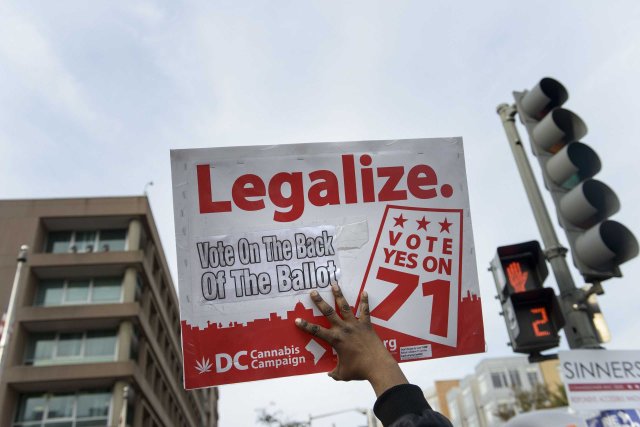
Brendan Smialowski—AFP/Getty Images A man holds up a sign for Ballot Initiative #71, the legalization of marijuana, in Washington, D.C., on Nov. 4, 2014. On Nov. 4, Oregon became the third state to legalize recreational marijuana for adults age 21 and older, with voters approving plans to set up a fully taxed and regulated market like Colorado and Washington state. By early Wednesday morning, the votes in Alaska had been counted, and that state became the fourth to embrace the historic social experiment. “The results are in, and marijuana prohibition is on its way out,” the Marijuana Policy Project’s Executive Director Rob Kampia said after the news broke.
In Washington, D.C., voters overwhelmingly approved a “soft legalization” measure. While sales remain illegal, if the new law passes muster with Congress, residents will be able to possess up to 2 oz. of weed for personal use and cultivate up to six plants at home without fear of civil or criminal penalty. Legalization advocates won smaller victories, too. Guam became the first U.S. territory to legalize medical marijuana, while South Portland, Maine legalized weed (in a somewhat symbolic vote). Legalization advocates lone loss on Election Day came in Florida, where a medical marijuana proposal fell three points short of the 60% it needed to pass.
-
The World’s First Legal Weed Market Opens
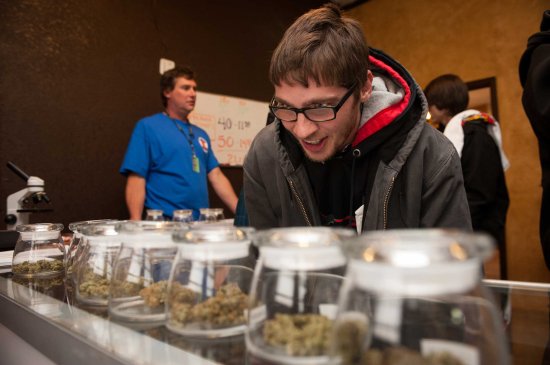
Theo Stroomer—Getty Images Tyler Williams of Blanchester, Ohio selects marijuana strains to purchase at the 3-D Denver Discrete Dispensary oin Denver on Jan. 1, 2014. Though marijuana had a big year, reaching new milestones nearly every month, none was more remarkable or historic than the first day of legal recreational weed sales in Colorado. In snow and cold, thousands of people waited in line outside the roughly three dozen pot shops that were fully licensed and stocked by New Year’s Day. Legalization advocates arranged and announced the first customer in advance: an Iraq war veteran named Sean Azzariti who had campaigned for legalization, saying the substance helps treat his post-traumatic stress disorder. At 8 a.m. in Denver, he bought an eighth-ounce of Bubba Kush weed and THC-infused truffles for about $60.
Though the Netherlands is, mistakenly, often thought of as a place where cultivating and selling weed is completely aboveboard, Colorado opened the world’s first fully legal and regulated marijuana market. “Nobody knows what is going to happen,” Denver City Councilman Charlie Brown told TIME shortly before opening day, which in the end was remarkably calm. “We’re the pioneers here.”